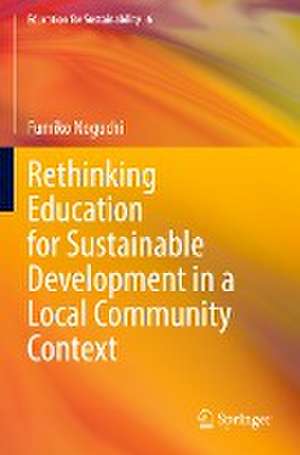Rethinking Education for Sustainable Development in a Local Community Context: Education for Sustainability, cartea 6
Autor Fumiko Noguchien Limba Engleză Paperback – 23 aug 2023
| Toate formatele și edițiile | Preț | Express |
|---|---|---|
| Paperback (1) | 938.66 lei 6-8 săpt. | |
| Springer Nature Singapore – 23 aug 2023 | 938.66 lei 6-8 săpt. | |
| Hardback (1) | 944.51 lei 6-8 săpt. | |
| Springer Nature Singapore – 22 aug 2022 | 944.51 lei 6-8 săpt. |
Preț: 938.66 lei
Preț vechi: 1144.71 lei
-18% Nou
Puncte Express: 1408
Preț estimativ în valută:
179.62€ • 188.00$ • 149.49£
179.62€ • 188.00$ • 149.49£
Carte tipărită la comandă
Livrare economică 01-15 aprilie
Preluare comenzi: 021 569.72.76
Specificații
ISBN-13: 9789811694660
ISBN-10: 9811694664
Ilustrații: XXV, 145 p. 19 illus., 15 illus. in color.
Dimensiuni: 155 x 235 mm
Greutate: 0.25 kg
Ediția:1st ed. 2022
Editura: Springer Nature Singapore
Colecția Springer
Seria Education for Sustainability
Locul publicării:Singapore, Singapore
ISBN-10: 9811694664
Ilustrații: XXV, 145 p. 19 illus., 15 illus. in color.
Dimensiuni: 155 x 235 mm
Greutate: 0.25 kg
Ediția:1st ed. 2022
Editura: Springer Nature Singapore
Colecția Springer
Seria Education for Sustainability
Locul publicării:Singapore, Singapore
Cuprins
Chapter 1: Introduction.- Chapter 2: Unpacking the Silencing of ESD.- Part I: Critical Ethnography.- Chapter 3: Indigenous Ainu Rights Recovery Movement in Japan.- Chapter 4: Socially-Critical Approach to ESD: Light and Shadow.- Chapter 5: Letting Go.- Part II: Critical Ethnography Research Beyond Socially Critical-ESD.- Chapter 6: Swing.- Chapter 7: Rethinking ESD from the Perspectives of a Socially-Marginalised Individual.- Chapter 8: Conclusion: Critical Reflection of Socially-Critical ESD and a Praxis Framework for ESD in a Community Development Context.
Notă biografică
Fumiko Noguchi is currently a research fellow at the Education for Sustainable Development (ESD) Program at the UNU-IAS. Born in Tokyo, Noguchi received an undergraduate degree in international economics and finance from Tsuda University. After her first career experience in banking in Japan, she moved to Australia to obtain a Master’s degree in Environmental Education at Griffith University. Since then, she has lived, worked, and studied in Japan and Australia. She completed her Ph.D. in ESD at RMIT University. She has gained extensive experience in practice, policy advocacy, research, teaching, and module development for ESD in the Asia-Pacific region for over twenty years. Throughout, she has consistently taken a community-based approach, valuing indigenous and local knowledge and learning.
Textul de pe ultima copertă
This book bridges the gap between Education for Sustainable Development and community development and examines the contributions of critical environmental education as a theoretical framework to the policy, research, and practice of Education for Sustainable Development. The book investigates what Education for Sustainable Development really means when it happens from the perspectives of a marginalized individual at the very bottom of society in a local community, where there is no such ‘educational’ institution, no policy or no curriculum to support the effort, but there is the necessity of learning and empowerment for changing the situation. In particular, drawing on the experience of the indigenous Ainu fisherman, it critically examines the theoretical foundation of Education for Sustainable Development, critical environmental education, investigating methodologically and epistemologically the relevance and efficacy of critical environmental education to socially critical approaches to Education for Sustainable Development in a community development context. And this investigation leads to develop a praxis framework for socially critical Education for Sustainable Development in a community development context so that both fields would be mutually supportive to strengthen the practices.
Caracteristici
Challenges the rhetoric-reality gap between Education for Sustainable Development and community development Attempts to hear the unheard voices that can identify the diverse knowledge and learnings in a local community Enriches the practice of critical ethnography in the ESD study






